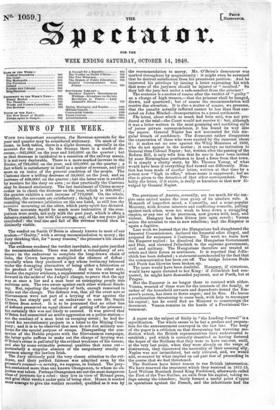The provinces of Austria, severally, are too much for the
em- pire once united under the iron grasp of its absolute rule. A Monarch of imperfect mind, a Camarilla, and a semi-popular Ministry, with diverse interests and conflicting councils, pulling against each other, were too weak to keep down a struggling empire, or any one of its provinces, now grown bold, loud, and violent. Hungary has been driven into open revolt ; Vienna seizes the occasion to rise in new rebellion; and the Emperor is again a fugitive.
Last week we learned that the Hungarians had slaughtered the Imperial Commissioner, declared the Imperial edict illegal, and. prepared for resistance it l'outrance. This week we learn how the Emperor replied : he dissolved the Hungarian Government and Diet, and elevated Jellachich to the supreme government, civil and military. The Hungarians therefore are treated as rebels and their forces as mutineers. It is reported that Jella- chich has been defeated ; a statement corroborated by the fact that the communication has been cut off. The bridge between Buda and Pesth has likewise been broken up.
The issue would have been doubtful. Hungary, if victorious, would have again dictated to her King: if Jellachich had con- quered, he might have demanded payment, not at Pesth, but at Prague. But the Emperor is no longer there to contend with either. Vienna, wearied of these wars for the interests of the family, or rather of the household servants and dependents round the Em- peror's person, has risen in fierce anger • and he flies. He leaves a proclamation threatening to come back, with help to reconquer his capital ; but he could find no Minister to countersign the document. Vienna remains in the hands of a Provisional Go- vernment.


























